International Colloquium - Aesthetics of Cruelty: Representations of Violence and Dehumanisation in Russia and South Africa
9 – 10 December 2020
View the programme

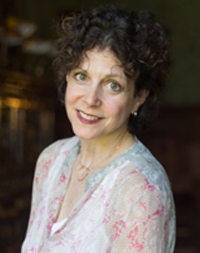 Nanci Adler
Nanci Adler
Nanci Adler is Professor of Memory, History, and Transitional Justice at the NIOD Institute for War, Holocaust, and Genocide Studies (Royal Netherlands Academy of Arts and Sciences) and the University of Amsterdam. She has authored and/or edited, among others, Keeping Faith with the Party: Communist Believers Return from the Gulag (Indiana University Press, 2012), The Gulag Survivor: Beyond the Soviet System (Transaction Publishers, 2002), Victims of Soviet Terror: The Story of the Memorial Movement (Praeger Publishers, 1993), and Understanding the Age of Transitional Justice: Crimes, Courts, Commissions, and Chronicling (Rutgers University Press, 2018). Her current research focuses on transitional justice and the legacy of Communism.
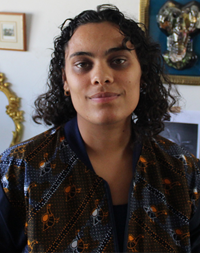
Stephané Conradie
Stephané Edith Conradie is a lecturer in printmaking at Stellenbosch University, South Africa. Although primarily a trained printmaker, she is known for her bricolage assemblages. She is currently also a PhD candidate in Visual Arts at the University of Stellenbosch. Her work examines the histories of colonialism and creolisation embedded in domestic material culture, calling into question how identity is encoded in the private domain. These objects have provided her with a language to investigate the creolised formations of identity that are linked to South Africa’s histories of colonialism, slavery, segregation and apartheid.

Andrea Gullotta
Andrea Gullotta is lecturer in Russian at the University of Glasgow. He has also worked for the University of Palermo, the Ca' Foscari University of Venice and the University of Padua, where he obtained his Ph.D. He is co-editor of the journal AvtobiografiЯ, which deals with life-writing and the representation of the self in Russian culture. His main research area is Gulag literature. He has authored dozen of works on Gulag literature, Gulag poetry and Gulag culture.
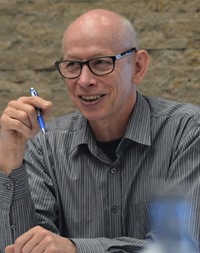
Björn Krondorfer
Björn Krondorfer is Director of the Martin-Springer Institute at Northern Arizona University and Endowed Professor of Religious Studies. The title of his new book is Unsettling Empathy: Working with Groups in Conflict (2020). He currently chairs the “Consortium of Higher Education Centers for Holocaust, Genocide, and Human Rights Studies.” He has organized several international academic symposia and has mentored the creation of several exhibits such as Through the Eyes of Youth: Life and Death in the Bedzin Ghetto; Resilience: Women in Flagstaff’s Past and Present; and a permanent installation of a Berlin Wall exhibit at NAU. He has curated the art exhibitions such as
Wounded Landscapes (2014) and Echoes of Loss: Artistic Responses to Trauma (2018).
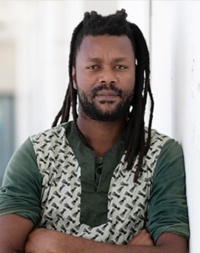 Nashilongweshipwe Mushaandja
Nashilongweshipwe Mushaandja
Nashilongweshipwe Mushaandja
is a performer, educator and writer with practice and research interests in the role of embodied and spatial archives in movement formation. Mushaandja is also a PhD artist at the Centre for Theatre, Dance and Performance Studies at the University of Cape Town studying Queer Praxis in Oudano Archives. His recent performance Dance of the Rubber Tree is a cross-disciplinary critical queer intervention in museums, theatre and archives in Germany, Switzerland, South Africa, Cameroon and Namibia. He is also involved in curative projects from time to time, such as the John Muafangejo Season (2016/2017), Operation Odalate Naiteke (2018/2020) and Owela Festival (2019).
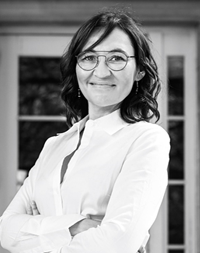 Siona O'Connell
Siona O'Connell
Professor Siona O’Connell (PhD) is an African Studies scholar at the University of Pretoria. Her research focus falls within three areas, that of Memory Studies, Creative Studies and Restorative Justice in postcolonial and post-apartheid South Africa. Her co-edited book, ‘Hanging on a Wire’ won the 2018 National Institute for the Humanities and Social Sciences (NIHSS) Humanities and Social award for the best non-fiction edited volume and her monograph on forced removals in Cape Town, ”An Impossible Return: Cape Town’s Forced Removals” continues to garner broad recommendations. She has curated numerous exhibitions and directed and produced 8 film documentaries that emerge out of her commitment to research that is focused on trauma, memory and belonging in post-apartheid South Africa.
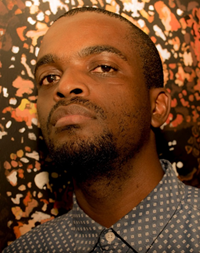 Pfunzo Sidogi
Pfunzo Sidogi
Pfunzo Sidogi is a lecturer in the Department of Fine and Studio Arts, Faculty of Arts and Design at the Tshwane University of Technology. A PhD candidate in Visual Arts at Stellenbosch University, his research examines the artistic representations of twentieth century urbanisation in South Africa by Black artists. He has published on themes related to art education, South African art, and comics.
 Anna Suvorova
Anna Suvorova
Professor Anna Suvorova is an art historian and a curator. She has a Ph.D. in History of Arts and has authored and co-authored more than 40 scientific articles and books on the history of Naive and Outsider Art. She has curated over 50 art exhibitions. She is currently the Head of the Master Program “Arts and Humanities” in Perm State University (Russia).
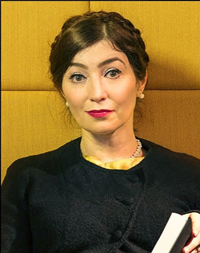 Katya Tolstoj
Katya Tolstoj
Professor Katya Tolstoj is Chair of Theology and Religion in Post-Trauma Societies and Founding Director of the Institute for the Academic Study of Eastern Christianity at the Vrije University, Amsterdam, and Founding President of the International Association for Post-Soviet Theology and Study of Religion. Her main interest in research and valorisations is to establish the new field of an interdisciplinary and interreligious post-Soviet theology, within the interdisciplinary landscape/scope of post-traumatic, post-totalitarian and post-genocidal studies. Her project Theology after Gulag is the first phase of this endeavour.
span id="greer">
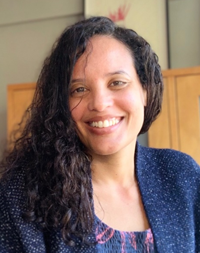 Greer Valley
Greer Valley
Greer Valley is a lecturer in Art History at the University of the Witswatersrand. She is also a Doctoral candidate in Art Historical Studies at Michaelis School of Fine Art and a Doctoral Fellow at the Archive and Public Culture Initiative at the University of Cape Town (UCT). Her research and practice interests include curatorial interventions in institutions and exhibition spaces focused on African colonial histories.Greer is experienced in the visual art, architecture and design industries in South Africa, the Netherlands and the UK.

